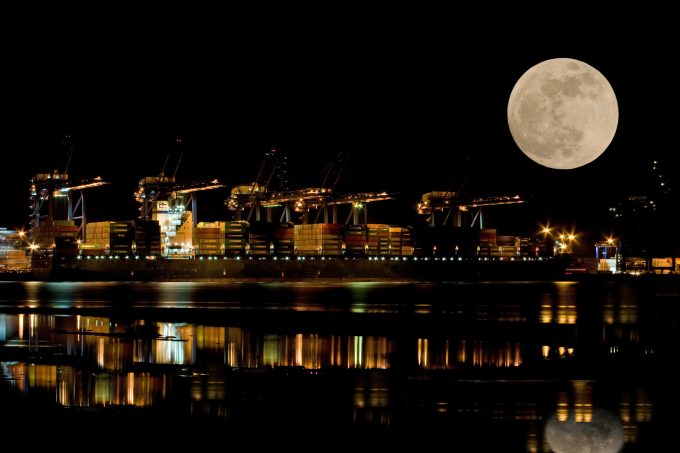Cost, slave labour and scams: the drivers for teenagers buying online
As we bring The Loadstar’s ecommerce series to a close, we are going to end ...
TFII: SOLID AS USUALMAERSK: WEAKENINGF: FALLING OFF A CLIFFAAPL: 'BOTTLENECK IN MAINLAND CHINA'AAPL: CHINA TRENDSDHL: GROWTH CAPEXR: ANOTHER SOLID DELIVERYMFT: HERE COMES THE FALLDSV: LOOK AT SCHENKER PERFORMANCEUPS: A WAVE OF DOWNGRADES DSV: BARGAIN BINKNX: EARNINGS OUTODFL: RISING AND FALLING AND THEN RISING
TFII: SOLID AS USUALMAERSK: WEAKENINGF: FALLING OFF A CLIFFAAPL: 'BOTTLENECK IN MAINLAND CHINA'AAPL: CHINA TRENDSDHL: GROWTH CAPEXR: ANOTHER SOLID DELIVERYMFT: HERE COMES THE FALLDSV: LOOK AT SCHENKER PERFORMANCEUPS: A WAVE OF DOWNGRADES DSV: BARGAIN BINKNX: EARNINGS OUTODFL: RISING AND FALLING AND THEN RISING

Container lines have come under fire from European shippers claiming the capacity crisis on eastbound exports has resulted in lost contracts and sales.
An emergency meeting of the European Shippers’ Council (ESC) last week heard some exports have been waiting two months to leave Europe, at the same time as spot rates are rising.
“The present capacity is insufficient to take all shipments,” said the ESC in a statement. “In addition, carriers provide no guarantee whatsoever that all goods of a shipment will be loaded.”
The council also said it needed to know whether these were genuine capacity challenges or simply a means for shipping lines to raise their prices.
“No shipper has been invited to discuss the present market situation, or consulted in any way about the balance between shipments and capacity.”
However, talking to The Loadstar, international transport director for French shippers’ association AUTF, Fabien Becquelin, said it was difficult to determine how much shippers had lost in revenues, noting that the majority of those affected dealt mainly in scrap material or low-value goods.
But, he argued, if the lack of capacity was solely due to ship repositioning before the new alliances launched, such problems could have been mitigated by planning and communication.
Noting blanked sailings in Asia, and the restructuring of services, Mr Becquelin said: “All these were predictable and should have been overcome by ad hoc preparation with customers, or a contingency plan.
“Carriers are allowed to cooperate technically, so why aren’t they doing it when it can be profitable for the vast majority of shippers?
“We have heard that there was a surge in European exports, but this has not been noticed by our members, the owners of the cargo. All we can see is the drastic reduction of available capacity in the lane.”
He added that if the lack of capacity was only due to repositioning, the situation would likely recover quickly.
Container shipping lines last year collectively lost billions of dollars as they were plagued by weak freight rates and overcapacity. But Mr Becquelin said it was not simply about price – but the requirement for a ship.
He said: “It is not the shippers that ‘make the market’. Prices are pushed by carriers which fought for market share prior to rationalisation.
“It is clear the financial situation is not sustainable. But whatever the situation, we are not talking mainly about price, we are talking about the minimum service that a carrier can offer: having a ship to board and a container to load with cargo.
“Furthermore, it is not acceptable to come back on already signed or agreed commitments – there is a history of a gentleman’s agreement in the maritime sector – or take goods hostage that are already in the ports.”
A new group made up of ESC members will monitor the situation closely, it said and plans to “analyse the changes in capacity, the time of delays, and the fluctuation of rates”.
Once the data has been collected it will be used to “decide on possible next steps”.
It added: “ESC will meet Europe’s DG Competition in the early summer to give them an informed view on the present crisis and discuss strategies to prevent this from happening again.”
Comment on this article
Alfred Ellis
April 05, 2017 at 1:16 pmOh right. So no carrier has ever had a call from a shipper blackmailing them to reduce their rates or lose the business? Carriers have been losing millions each week for years – and now rates are beginning to turn the shippers are crying foul. I didn’t hear too many complaints when they were paying less to get a box halfway round the world than they were for a domestic haulage price.
You want space? Pay the money.